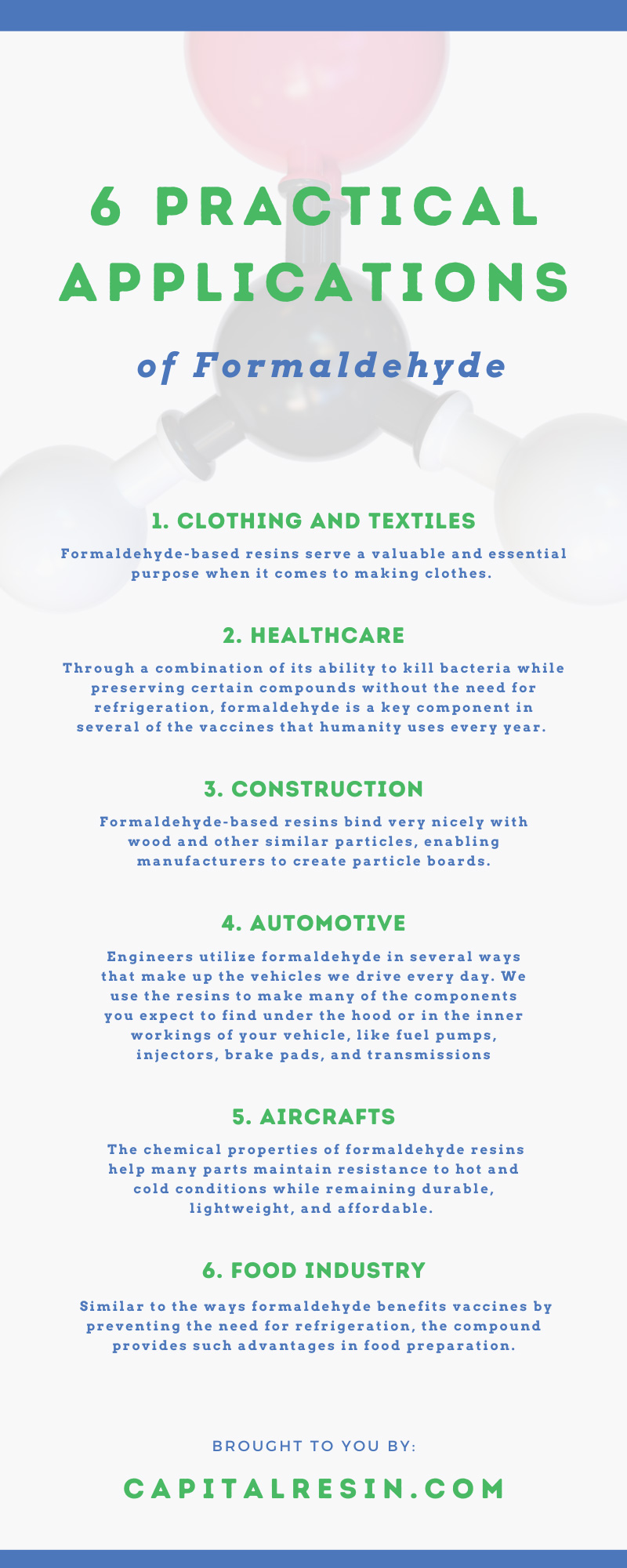There’s a specific connotation to formaldehyde when it comes up in conversation. Many have a limited understanding of the chemical and associate it with glass jars in science labs and mortuaries. However, CH2O, otherwise known as formaldehyde, is highly versatile, and industries use it in a variety of ways that the average person may not even realize.
Here are six practical applications of formaldehyde and how it works in different products or services. In some cases, we use formaldehyde directly, while others may convert it into a resin or similar form to take full advantage of its capabilities. Understanding the basic structure of this naturally occurring compound makes it easier to see how we can utilize it for daily purposes.
1. Clothing and Textiles
Formaldehyde-based resins serve a valuable and essential purpose when it comes to making clothes. The resins can help connect pigments and dyes, which makes the colors more vibrant and prevents them from bleeding in the wash. Many modern clothing garments have traces of these resins to help the colors stand out and reduce the risk of fading at higher temperatures.
Many manufacturers also work with formaldehyde resins to make finishers for cloth items, which can help reduce the risk of wrinkling or staining. Manufacturers commonly use these finishers when producing clothes but they are especially beneficial to bed sheets, tablecloths, and window treatments like curtains or drapes.
Chemical engineers can further utilize formaldehyde resins by combining them with other compounds to make 1,4 Butanediol, which makes tetrahydrofuran (THF) resins. These resins create strong, elastic fibers that we commonly use to make yoga pants, spandex, and other top-quality athletic gear.
2. Healthcare
While people often think about formaldehyde as a useful component in laboratories, they may not consider all the incredible medicinal breakthroughs that formaldehyde has provided throughout history. For starters, formaldehyde helps kill many types of bacteria, fungi, and viruses, so it’s a common ingredient and component in antiseptic liquids, gels, and creams.
Through a combination of its ability to kill bacteria while preserving certain compounds without the need for refrigeration, formaldehyde is a key component in several of the vaccines that humanity uses every year. Just a few of the vaccines that contain formaldehyde include the flu vaccine, polio, and hepatitis A.
Formaldehyde is an active ingredient in many over-the-counter drugs that have a capsule or pill form. It benefits anti-infective medicines by speeding up the absorption process, enabling it to kill off more harmful bacteria at a speedier rate.
3. Construction
One of the most practical applications of formaldehyde comes from the construction industry. Formaldehyde-based resins bind very nicely with wood and other similar particles, enabling manufacturers to create particle boards. Instead of discarding, burning, or otherwise wasting countless pounds of shavings, sawdust, and other wood byproducts, manufacturers can compress and bind them with resins to make particle board and other similar materials.
Formaldehyde resins specifically offer particle boards a sturdier form and increase general fire resistance to make them more long-lasting than other similar binding agents or polymers. Aside from wood-based products, we also use these resins to make insulation, laminates, countertops, and other valuable pieces of construction material. The easy-to-use and affordable byproducts of formaldehyde resin allow for more reasonable and accessible materials that help keep the market open.
4. Automotive
Engineers utilize formaldehyde in several ways that make up the vehicles we drive every day. We use the resins to make many of the components you expect to find under the hood or in the inner workings of your vehicle, like fuel pumps, injectors, brake pads, and transmissions. The formaldehyde resins help lubricate these parts and manufacturers construct them in a way that makes them last for a long time and minimizes the need for replacement.
However, formaldehyde resins make up far more of the vehicle than just the moving parts under the hood. As we mentioned earlier, many fabrics and textiles benefit from the properties of formaldehyde, including the interior of a vehicle. The seat upholstery and carpeting often have formaldehyde resins mixed in to make them long-lasting and stain-resistant.
5. Aircrafts
Airplane parts require extreme durability and the ability to withstand extreme temperatures. Fortunately, the chemical properties of formaldehyde resins help many parts maintain resistance to hot and cold conditions while remaining durable, lightweight, and affordable. Formaldehyde resins are an essential part of several plane components, from the landing gear and brake pads to the insulation that creates the vacuum seals on doors and windows to pressurize the cabins and keep passengers and flight crew safe from external conditions at thousands of feet in the air.
Apart from the actual construction of the aircraft, formaldehyde helps with engine operations. Formaldehyde is a common component in the engine lubricant that allows the motor to move without parts grinding against each other, overheating, or breaking down.
6. Food Industry
The idea of chemicals in food gives people cause for concern, and you wouldn’t think that CH2O would prove valuable in food preservation. However, similar to the ways formaldehyde benefits vaccines by preventing the need for refrigeration, the compound provides such advantages in food preparation. Many food products like beef, apples, pears, coffee beans, spinach, green onion, and fish contain natural amounts of formaldehyde, which are harmless to consume. The formaldehyde’s antimicrobial and antioxidant properties help slow spoilage and make it easier for us to preserve our food and keep it fresher for longer.
Capital Resin Corporation is an expert formaldehyde producer that aims to help businesses and consumers understand the safe, practical, and beneficial applications of this compound rather than letting it build a reputation as an entirely harmful chemical. No matter what your industry is, we’re here to help you design, perfect, produce, and manufacture formaldehyde resins that can amplify your next big project.
You can rest easy knowing that when you work with a trusted chemical engineering partner like Capital Resin Corporation, you’re working with a company with decades of experience and knows how to keep things moving in the right direction. We aim to work within the confines of your project deadline and get you the results you need. Don’t hesitate to contact us anytime for more details, or if you have any further inquiries about the services we offer. We’ll be happy to explain the process.








